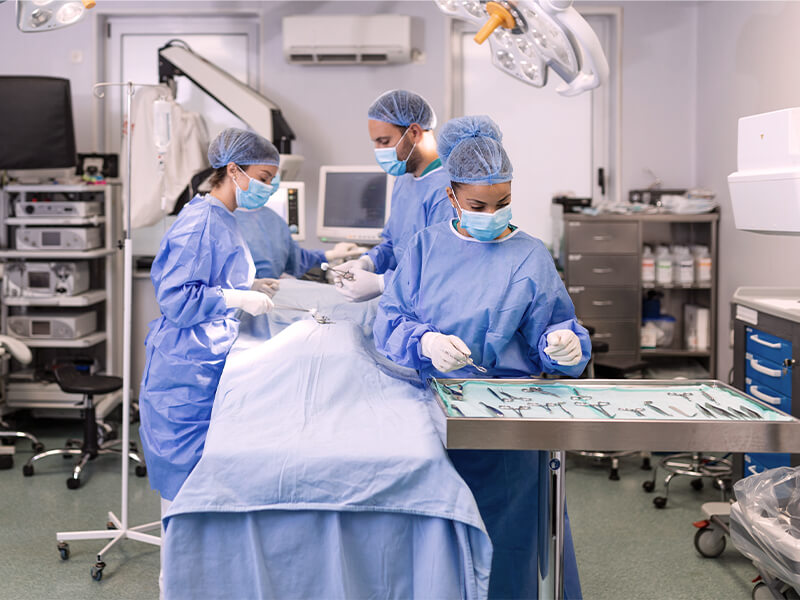It is important to understand Obesity and available solutions. Obesity increases so does the BMI and with it there may be an increase in blood sugar, blood pressure, low-density lipoprotein (LDL or “bad”) cholesterol, triglycerides.
These changes translate into increased risk for coronary heart disease, stroke and cardiovascular complications. The significance of increasing weight or waist circumference is directly proportional to the risk of developing diabetes, hypertension, ischemic heart disease and cerebrovascular accidents.
It also makes you more likely to have conditions including:
- Gallbladder disease and gallstones
- Osteoarthritis
- Gout
- Some cancers
- Breathing problems, such as sleep apnea
- GERD (Heart burns, acidity)
- Social Embarrassment, Depression
- Lower limb Venous Stasis
- Lymphedema
- Infertility
- Stress Incontinence
- Intertrigo
- Nonalcoholic steatohepatitis (NASH), NAFLD
Highlights
Department of Bariatric Surgery at MGM Hospital Vashi has been in existence for more than a decade. We are successfully performing procedures like Laparoscopic Vertical Sleeve Gastrectomy, Laparoscopic Gastric Bypass & other procedures. The department has a fully multi-disciplinary team of doctors including; Bariatric Surgeon, Bariatric Physician, Endocrinologist, Nutritionist, Psychologist, Physiotherapist, Cardiologist & Pulmonologist. Being a tertiary care hospital, we not only operate but have good long-term maintenance programs for the patients helping them achieve long term benefits and changing their way of life.
Obesity is a growing problem all over the world. Bariatric Surgery works!
Bariatric surgery is done on the stomach and small intestine. It achieves three primary goals:
- Food intake (restriction)
- Satiety (hunger)
- Absorption of calories
Bariatric surgery which reverses diseases like Diabetes, Hypertension, Dyslipidemia (high cholesterol) is called metabolic surgery.
In extreme obesity it has been found that diet and exercise do not yield satisfactory and sustained weight loss. Morbidly obese people are unable to exercise enough due to the weight and commonly associated knee and back problems. They need assistance to achieve a diet modification and reduce calorie intake. ‘Bariatric surgery’ has been found to be an extremely effective technique of achieving persistent sustained weight loss in morbidly obese patients.
Services
Adjustable gastric banding
Sleeve gastrectomy
Gastric bypass
Mini Gastric Bypass
Duodenal Switch
Revisional Bariatric Surgeries
These can be performed using Minimal access techniques:
- Laparoscopy
- Single incision surgery
- Robotic Surgery for Bariatrics
Some bariatric surgeries may work better than the other. In the order the surgery with least metabolic effects is the ‘Adjustable Gastric Band’ better than that is the Vertical Sleeve Gastrectomy. ‘Gastric Bypass & Mini Gastric Bypass are bariatric surgeries with excellent metabolic reversal, it means that these surgeries have extremely good cure rate for Type2 Diabetes Mellitus, Dyslipidemia, Hypertension & Ischemic heart disease. Other surgeries like the Bilio-pancreatic diversion & duodenal switch which work well too but have severe nutritional problems hence are not preferred as primary operations. Lately surgeries like the ‘Ileal interposition’ are being performed which are supposed to be ‘purely metabolic’ with less weight loss effect and are being done for diabetics who are not morbidly obese.
Technology & Infrastructure
MGM Hospital Vashi boasts of state-of-the-art surgical technology for weight-loss surgery. Surgical weight loss can be performed by laparoscopy or key hole surgery in which operations are performed through 4 – 5 small (usually 0.5 – 1.2 cm) incisions. Specialized equipment and instrumentations for this technique are available. MGM Hospital Vashi is updated with latest additions in the field of laparoscopy include Single Incision Laparoscopic surgery, Robotic surgery & Endoluminal surgeries all of which are aimed at increasing the safety of the procedures as well as making it less invasive than conventional laparoscopic procedures.
Our Specialists
FAQs
What are the causes of obesity?
Basically there is calorie accumulation. If one start accumulating 100 Kcal extra every day in 10 years I will be 40 Kgs overweight! It is about lifestyle; as someone would say ‘everyone in my family is overweight’ as they all have similar dietary habits. One important cause is a sedentary daily routine which is due to a lifestyle of convenience. When we work a lot I ‘exhaust’ not ‘exercise’. Abundance of high calorie, cheap ready to eat food (fast foods) in today’s world is one significant factor.
SEVERE OBESITY: The causes of morbid obesity are multiple and complex. Research has indicated that underlying cause of morbid obesity may be genetic.
How to know if one is obese?
What is the treatment of obesity?
The main stay of obesity control or weight reduction is to reduce calorie intake. Exercise helps in maintaining the weight reduction over long term. This can be achieved through control of dietary intake. It is a good idea to meet a qualified expert in nutritional sciences and follow their advice. Carefully note your daily food consumption and calculate the calories you consume. Try to reduce the calories consumed but at the same time maintain adequate intake of proteins, carbohydrates, fats, vitamins and micronutrients. The important thing to remember is that while on diet and exercise regimen one has to achieve a change in lifestyle for a long time so as to have a good sustained weight loss. Several drugs have been used to achieve weight loss but many of them were found to have side effects and are now banned. There are several drugs in experimental phase the long term outcome of which needs to be studied.
What is the nutritional effect of Bariatric surgery?
What can be the cause for insufficient weight loss or sometimes weight regain after Bariatric surgery?
If the person who has undergone bariatric does not follow the diet pattern advised by the bariatric nutritionist and resorts to consuming high calorie liquids like coke, ice creams, sweet liquid or semi-liquid food then this defeats the purpose of bariatric surgery.
What is ‘Metabolic Syndrome’?
- A large waistline.
- High triglyceride (or you’re on lipid lowering medications).
- Low level of HDL (or you’re on lipid lowering medications).
- High blood pressure (or you’re on medicine to treat high blood pressure).
- High fasting blood sugar (or you’re on medicine to treat high blood sugar).
When two or more of the above factors are present then the person is said to be suffering from ‘Metabolic Syndrome’. Obese people have a very high risk of developing metabolic syndrome. People suffering from metabolic syndrome have a significantly higher risk of developing heart diseases and Diabetes.
What is ‘Metabolic Surgery’?
Bariatric surgery which reverses diseases like Diabetes, Hypertension, Dyslipidemia (high cholesterol) is called metabolic surgery.


